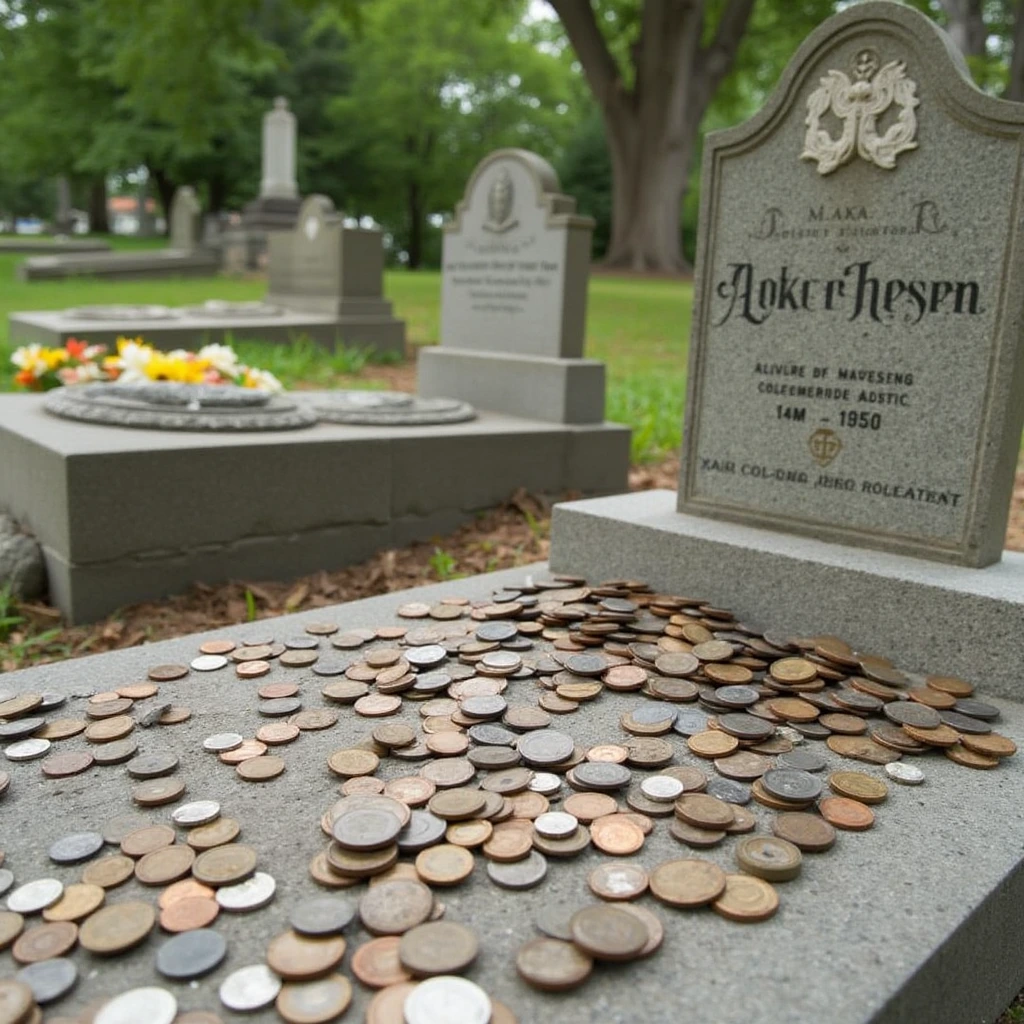If you’ve ever walked through a cemetery, you may have noticed coins placed on gravestones. This tradition has been practiced for centuries, symbolizing respect, remembrance, and gratitude for the deceased.
But what does each coin mean? And where did this tradition originate? In this article, we’ll explore the history, meanings, and cultural significance of leaving coins on graves.
The Origins of Leaving Coins on Gravestones
The practice of leaving coins on graves dates back to ancient times. In Greek mythology, it was believed that after death, souls had to cross the River Styx to reach the afterlife. The ferryman Charon required a payment to transport the soul across, so loved ones would place coins on the eyes or in the mouth of the deceased as a toll for passage.
This tradition evolved over time, becoming a symbolic gesture of honoring and remembering the dead. Today, it is most commonly associated with military graves and those who have served their country.
According to Wounded Warrior Project, leaving coins on the graves of military personnel is a way to show respect, gratitude, and connection to the fallen soldier’s family.
Similarly, Beechwood Cemetery explains that the tradition has also expanded beyond the military, serving as a simple way to let others know that a grave has been visited and that the deceased is remembered.
The Meaning of Different Coins on Gravestones
Different types of coins left on graves can carry specific meanings, particularly in military traditions:
🪙 1. Penny – A Sign of Respect
- A penny means that someone has visited the grave to pay their respects.
- It does not indicate any personal connection to the deceased, but simply acknowledges that they are remembered.
🪙 2. Nickel – Shared Boot Camp Experience
- A nickel signifies that the visitor and the deceased trained together in boot camp.
- This is especially common in military cemeteries, where fellow service members want to honor their comrades.
🪙 3. Dime – Served Together in the Military
- A dime means that the person who left it served with the deceased at some point during their military career.
- This coin is a more personal tribute, showing a direct connection to the fallen soldier.
🪙 4. Quarter – Witness to Their Passing
- A quarter is the most significant coin, indicating that the person was present when the deceased died.
- It serves as a powerful symbol of witnessing their sacrifice and ensuring their memory lives on.
✅ Pro Tip: When visiting a cemetery, if you see a quarter on a grave, it means someone was with that person during their final moments.
Why Do People Leave Coins on Non-Military Graves?
While this practice is most commonly associated with military traditions, it has expanded to include all types of gravesites. People leave coins on gravestones for various reasons:
🏛️ 1. Paying Tribute to Loved Ones
- Many people leave coins as a symbol of love and remembrance.
- It’s a way of saying, “I was here, I remember you.”
🕊️ 2. Religious and Cultural Significance
- In some religions, placing coins on graves is believed to help the deceased in the afterlife.
- It’s a practice seen in Jewish and Christian traditions, where small tokens are left to show ongoing love and respect.
📜 3. Marking a Visitation
- Some people leave coins as a physical marker that they visited the grave.
- This lets others know that the deceased is still remembered and honored.
Coins vs. Other Items Left on Graves
People don’t just leave coins on graves—other objects also hold deep significance.
💐 1. Flowers
- Symbol of love, beauty, and remembrance
- Different flowers have different meanings (e.g., red roses = love, white lilies = purity)
🎗️ 2. Stones
- Common in Jewish tradition
- Represents permanence and lasting memory
🎖️ 3. Medals and Challenge Coins
- Left on military graves to recognize honor, service, and sacrifice
🍷 4. Personal Items
- Some visitors leave cigarettes, liquor, or small trinkets that were meaningful to the deceased
✅ Pro Tip: If you visit a grave, consider leaving a coin or small token as a sign of respect.
Frequently Asked Questions (FAQs)
🔹 What happens to the coins left on graves?
- In many cemeteries, the coins are collected and donated to charities or used for grave maintenance.
🔹 Is it okay to take a coin from a gravestone?
- No. Removing a coin from a grave is considered disrespectful unless you are a family member collecting them for charity.
🔹 Do different cultures have similar traditions?
- Yes! Many cultures, including the Greek, Roman, Jewish, and Christian traditions, practice leaving coins or small items on graves as a sign of respect.
🔹 Can anyone leave coins on a grave, or is it just for the military?
- Anyone can leave coins on graves—it is a universal symbol of remembrance and respect.
Final Thoughts
The tradition of leaving coins on gravestones is a beautiful way to honor and remember the deceased. Whether as a military tradition, a cultural practice, or a personal act of love, each coin carries a message:
✔️ You are remembered.
✔️ You are honored.
✔️ Your sacrifice and life mattered.
Next time you visit a cemetery, consider leaving a small token of remembrance. It’s a simple yet powerful gesture that speaks volumes.
💡 Did You Know? If you leave a quarter, it means you were there when they passed away—a profound way to mark the memory of their final moments.

